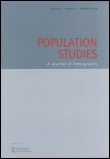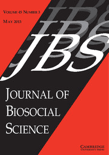
GENUS
metrics 2024
Exploring the Pulse of Society Through Demography
Introduction
GENUS is a prestigious open-access journal published by SpringerNature, dedicated to advancing research in the field of demography. With an E-ISSN of 2035-5556, it has been operating as an open-access platform since 2016, ensuring that valuable demographic knowledge is accessible to a global audience. Located in Switzerland, this journal contributes significantly to the scholarly community, achieving a remarkable Q1 ranking in the 2023 Scopus category for Social Sciences focusing on Demography, where it stands at an impressive Rank #12 out of 139, placing it in the 91st percentile. With a history that spans several decades, starting from 1970 and including comprehensive coverage from 2007 to 2024, GENUS provides a vital forum for researchers, professionals, and students seeking to engage deeply with current demographic studies. This journal not only publishes cutting-edge research but also facilitates fruitful discussions on key demographic trends and policies, making it an essential resource for anyone interested in the social sciences.
Metrics 2024
 -
- 2.10
2.10 -
- -
-Metrics History
Rank 2024
IF (Web Of Science)
JCI (Web Of Science)
Quartile History
Similar Journals

European Journal of Population-Revue Europeenne de Demographie
Illuminating Population Dynamics Across EuropeWelcome to the European Journal of Population-Revue Europeenne de Demographie, a premier scholarly publication dedicated to advancing the field of demography. Published by Springer since 1985, this journal has established itself as a vital resource for researchers, professionals, and students interested in population studies, evidenced by its Q1 ranking in Demography for 2023 and a notable Scopus ranking within the top 20% of its category. With an ISSN of 0168-6577 and an E-ISSN of 1572-9885, the journal provides a platform for high-quality, peer-reviewed research, contributing to the understanding of population dynamics and demographic trends across Europe and beyond. Although currently not open access, the journal ensures broad mobility of knowledge through diverse access options, aspiring to bridge theoretical insights and practical applications crucial for policy-making and societal engagement. Join us in exploring the intricate tapestry of demographic data as we examine pressing issues such as migration, fertility, mortality, and population aging in an ever-evolving global context.

Canadian Studies in Population
Exploring Canada's Demographic LandscapeCanadian Studies in Population, published by Springer, is a prestigious journal dedicated to advancing the field of demography and the history of population studies within Canada and beyond. With an ISSN of 0380-1489 and an E-ISSN of 1927-629X, this journal has proudly contributed to scholarly discourse since its inception in 1975, and continues to make significant impacts through its rigorous research articles and comprehensive reviews. Recognized for its high academic standards, it boasts a Q2 ranking in Demography and a Q1 ranking in History in 2023, reflecting the journal's critical role in shaping contemporary understanding of demographic trends and historical population developments. With a Scopus rank of #51/139 in Demography and #83/1760 in History, it appeals to a diverse audience including researchers, professionals, and students eager to explore population dynamics, historical context, and societal implications of demographic shifts. While the journal maintains traditional subscription access options, its rigorous peer-reviewed content ensures that it remains a cornerstone for scholars seeking credible and influential insights in their respective fields.

Population Review
Connecting Scholars to Contemporary Population IssuesPopulation Review, published by Sociological Demography Press, is a vital resource in the field of demography, contributing to the understanding of population dynamics and trends since its inception in 1988. With an ISSN of 1549-0955 and an E-ISSN of the same number, the journal has played a significant role in disseminating scholarly research and analysis relevant to demographic changes and their implications. Although currently categorized in the Q4 quartile, it ranks 78th out of 139 in the Scopus Social Sciences: Demography category, placing it within the 44th percentile among its peers. This journal serves as a platform for researchers, professionals, and students to engage with contemporary population issues, encouraging the exploration of new theories and methodologies. While not available as open access, its robust editorial standards and commitment to rigorous research make it an invaluable addition to the libraries of demographers and social scientists alike.

Novedades en Poblacion
Connecting Research and Policy for Vibrant CommunitiesNovedades en Poblacion is a pivotal academic journal dedicated to the interdisciplinary exploration of demographic studies, population policies, and social dynamics, published by UNIV HABANA. Since its inception in 2005, this open access journal has provided a platform for researchers, professionals, and students to disseminate and discuss cutting-edge research and findings relevant to populations in Latin America and beyond. With a commitment to high-quality scholarship, Novedades en Poblacion plays a vital role in contributing to the global conversation on demographic changes, migration patterns, and socio-economic impacts on populations. Researchers are encouraged to submit original articles, reviews, and studies that advance the understanding of demographic issues, making it an essential resource for those engaged in the fields of sociology, public health, and urban studies.

History of the Family
Investigating the Roots of Family in Historical ContextsHistory of the Family, published by Routledge Journals, Taylor & Francis Ltd, is a leading academic journal that provides a critical platform for scholarly discourse in the field of family history. With an ISSN of 1081-602X and an e-ISSN of 1873-5398, this journal has effectively converged its influential research from 1996 to 2024, making it a longstanding resource for historians, sociologists, and social scientists dedicated to understanding familial structures and their evolution across cultures and periods. Recognized for its academic rigor, History of the Family features a Q1 quartile classification in History and ranks impressively within the top percentiles in various related fields, including the 95th percentile in Arts and Humanities - History. While not an Open Access journal, it maintains robust access options for institutions and researchers alike. Readers can expect high-quality articles that contribute to the critical analysis of family dynamics, making it essential reading for anyone engaged in historical and social science research.

POPULATION STUDIES-A JOURNAL OF DEMOGRAPHY
Unraveling the Complex Tapestry of Demographic ChangePopulation Studies: A Journal of Demography is an esteemed scholarly publication dedicated to advancing the understanding of demographic trends and their historical contexts. Published by Routledge Journals, Taylor & Francis Ltd, this journal has a notable impact in its field, recognized as a Q1 category journal in both Demography and History as of 2023. Its Scopus rankings highlight its significance, featuring a remarkable 12th place rank in Arts and Humanities—History and 19th place in Social Sciences—Demography, both underscoring its influential role in academic research. Established in 1947, the journal has consistently contributed to the discourse in population studies, offering a platform for innovative research and critical analysis. While it does not provide open access options, it remains a vital resource for researchers, professionals, and students who seek to explore the complex relationships between population dynamics and historical narratives. Its comprehensive coverage from 1947 to 2024 ensures a rich repository of knowledge, making it essential for anyone involved in demographic research.

Socius
Fostering inclusive dialogue through accessible social science research.Socius, published by SAGE Publications Inc, stands as a pivotal Open Access journal in the field of social sciences, having garnered significant recognition since its inception. With an ISSN of 2378-0231, it operates from the United States and is dedicated to advancing our understanding of societal dynamics through high-quality research. Ranking in the top quartile (Q1) among similar journals in the Social Sciences category and ranking 38th out of 275 in Scopus, Socius plays a crucial role in disseminating impactful findings to researchers, professionals, and students alike. Its commitment to Open Access, initiated in 2016, underscores the journal's objectives to enhance visibility and accessibility of research outcomes, promoting a more inclusive discourse on pressing social issues. With converged years extending from 2015 to 2024, Socius continues to establish itself as a vital platform for innovative research and an essential resource for anyone engaged in the exploration of the complex fabric of society.

POPULATION
Illuminating the Path of Population SciencePopulation, an esteemed journal published by the Institut National d'Études Démographiques (INED), serves as a critical platform for the dissemination of high-quality research in the field of demography. With the ISSN 0032-4663 (Print) and E-ISSN 1957-7966 (Online), this journal covers a wide spectrum of topics related to population studies, including migration, fertility, mortality, and population policy, offering a comprehensive lens on demographic trends that influence societies worldwide. Although it operates under a traditional subscription model, its rigorous peer-review process ensures that only the most impactful and relevant research findings are published. With its long-standing reputation among scholars and practitioners in the demographic domain, Population plays a vital role in shaping the academic discourse and guiding future research directions. Scholars, professionals, and students alike will find in its pages not only innovative perspectives but also critical insights that reflect the complexities of population dynamics in a rapidly changing world. For those dedicated to understanding the demographic challenges that societies face today, this journal remains an invaluable resource.

JOURNAL OF BIOSOCIAL SCIENCE
Exploring the Interconnections of Biology and SocietyJOURNAL OF BIOSOCIAL SCIENCE, published by Cambridge University Press, is a pivotal interdisciplinary journal dedicated to advancing our understanding of the complex interplay between biological and social factors in human health and society. With an ISSN of 0021-9320 and an E-ISSN of 1469-7599, this journal has been a cornerstone of scholarly communication since its inception in 1969, paving the way for innovative research until 2024 and beyond. The journal is ranked in the Q3 quartile in Public Health, Environmental and Occupational Health and Q2 in Social Sciences (miscellaneous), reflecting its significant impact in these fields. Its Scopus ranking further emphasizes its relevance, sitting at #79 out of 275 in General Social Sciences and #334 out of 665 in Public Health. Researchers, professionals, and students are encouraged to explore the journal's rich repository of articles that delve into critical biosocial issues, fostering a deeper understanding of how social structures influence health and well-being. Although not open access, the journal remains an essential resource for those committed to addressing contemporary health challenges through a biosocial lens.

Journal of Demographic Economics
Innovating Understanding of Population DynamicsThe Journal of Demographic Economics, published by Cambridge University Press, stands as a leading interdisciplinary platform dedicated to the exploration and advancement of research in the intertwined fields of demography, economics, and geography. With an impact factor that reflects its esteemed position—ranking in the Q1 quartile for Demography (2023)—the journal fosters scholarly dialogue through high-quality articles that elucidate the complex interactions between population dynamics and economic trends. Operating under an open access model, the journal ensures that its findings are widely accessible, promoting inclusivity and engagement among researchers, professionals, and students alike. The Journal of Demographic Economics endeavors to bridge gaps in knowledge by publishing innovative and rigorous studies, thereby contributing significantly to both theoretical frameworks and practical applications across various domains. Drawing submissions from a global audience, this journal not only enhances the understanding of demographic transitions but also informs policy decisions and socioeconomic development strategies, making it an essential resource for those invested in demographic and economic research.